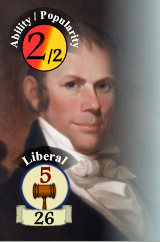As the Statesman ratings have been cause for some comment and as I did not discuss them in the Design Notes, I thought I might do so here.
When it comes to Popularity, I felt it would be wrong to start the Statesmen at the Popularity they would eventually reach. Instead, each is rated for what he had when he first appeared on the scene, or if he came on the scene before 1789, what he had in 1789. Thus most start out pretty low and, as they did historically, must earn the Popularity that they did historically. The oldest generation such as Washington, Franklin, Adams and Jefferson do begin with significant Popularity because by 1789 they had done a lot and had plenty of it. Congressional support ratings are treated similarly.
 Henry Clay |
There are a few exceptions to these two guidelines, for example, Henry Clay. He got himself elected Speaker of the House as a freshman Congressman, which is completely amazing, showing he had Popularity, as well as Congressional support, from the start.
The Ability rating in the game is a bit of a misnomer. It represents administrative ability only and maybe I should have called it Administrative, but perhaps that would be less clear. More importantly, it does not take into account political skills in dealing with others, i.e reading a room, negotiation, cajoling, arm-twisting, estimating the electorate, public speaking, etc. etc. etc. The players must provide these qualities themselves. It's sort of a role playing game in that sense. Otherwise maybe Lincoln would be a 7, Polk a 5 and poor J.Q. Adams a 4.1, but the game demands that the players supply that political part.
Created: 27 October 2015

